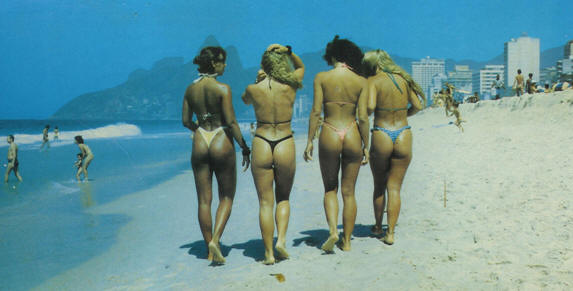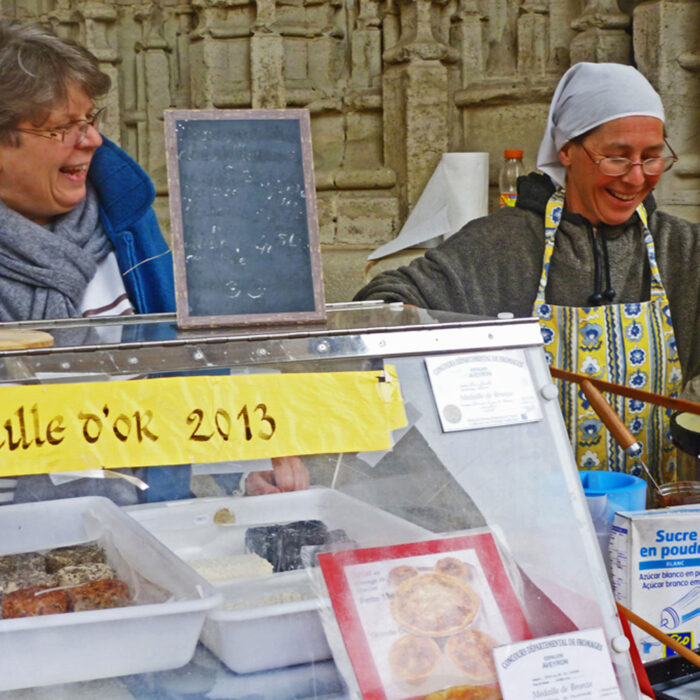You have no items in your cart. Want to get some nice things?
Go shopping

Rio de Janerio is an opera stage of mirth and tragedy, outrageous sets: the splendid, grandiose architecture of the rich against a background of favelas, filthy slums that spill down from hills where those immersed in poverty can overlook the blue Atlantic and those fortunate enough live below. As I am walking to the ocean front I pass graffiti sprayed in big red letters on a police station wall. It reads (in English), “To Protect The Rich And Persecute The Poor.”
Cheap candles flicker nervously from cola bottle necks, small altars built along the edges of the sidewalk next to fireplugs, tree trunks. Cigarettes and bits of candy have been left with shiny coins made worthless by this country’s runaway inflation. Of no use except as offerings to ancient jungle spirits who believers hope might help a displaced soul survive another day on city streets.
I have arrived at Ipanema beach this sun-blessed afternoon beneath a Maxfield-Parrish sky. It’s not as crowded as it was this weekend, but the girls are here . . . as always. G-string bathing suits, called fio-dentals, by the locals – dental floss. They don’t leave much to the imagination. Female bathers are kept busy with a constant tugging, pushing, pulling and adjusting to avoid complete exposure.
I have never seen such an abundance of attractive women, and attractive men, as I have found in Rio – every race and creed, a multi-cultured sun-tanned universe. All seem to have a free and easy style particular to Cariocas, those who live within this world class city. There is a pervading sense of nonchalance, a friendly unpretentiousness and easy going.
There’s no hurry. Rich or poor, it’s all the same here. Many of the later try to earn a living on the beach. The more successful rent out chairs and umbrellas as others peddle beer and trinkets, straw hats, T-shirts, suntan lotion. There’s a peanut man who leaves small samples of his stock upon the chests of snoozing bathers – bait. He comes back every 30 minutes . . . walking up and down from one end to the other. Someone else sells shrimp kabobs from a red plastic cooler hanging on his shoulder, and cheap plastic glasses to protect against the glitter of the sparkling blue-green sea.
A pair of prostitutes pass by, one white, one black, both beautiful enough to be in magazines. One’s caught my eye and points a finger at herself, arching an eyebrow. “Me?”
I look away. Most people know that AIDs is rampant here, but Rio doesn’t like to talk about it. News like that can hurt the tourist industry. They come and go. Pun not unintended.
Walking barefoot, carefree in the frothing surf, I see an older, German couple that checked into my hotel this morning. From some 40 yards away their whiteness has attracted my attention and, apparently, some others. There’s a slender, black skinned boy approaching from their rear, 18 or maybe 20 years of age. He drops into a crouch and finally, gently, in slow motion, sits behind them, at their blanket’s edge. The Germans are both overweight and unaware, eyes feasting on the white capped waves ahead, or some bronzed beauty . . . maybe lost in thought – the stock market in Frankfurt. Did those papers make it to Berlin on time? The husband notices I’m staring at them, so I point behind his back, at what is going on. He doesn’t get it and does not respond.
Occurs to me the boy might be some sort of tour guide they have with them. As I watch he gently lifts the German’s beach bag up, and sets it down with care beside him, turning so his body is between the bag and unsuspecting couple. He goes through it quickly with one hand and has completed his investigation by the time I’m passing by them, walking backwards now to see what happens next.
The others sitting near enough to see what’s going on ignore the situation. I suppose it’s possible they haven’t noticed, but more likely they don’t want to get involved . . . like me. It’s possible the thief might have a friend to watch his back.
At any rate he’s not found anything of value. The tourists must have paid attention to the printed warnings passed out at the airport, and at our hotel:
“Do not wear ear rings, jewelry or expensive watches on the bus.
Do not take anything of value to the beach.”
The slender youth returns the tourist’s bag to its original position, then stands and slowly walks away with casual grace.
They have an easygoing style in Rio, graceful nonchalance . . . no hurry.
About Bruce Louis Dodson
Bruce Louis Dodson is an expat living in Borlänge, Sweden with his wife, cat and dog. He is an collagist, photographer and writer of fiction and poetry. His work has appeared in: Barely South Review -Boundaries Issue, Blue Collar Review, Pulsar Poetry (UK), Foliate Oak, Breadline Press West Coast Anthology , Qarrtsiluni, Struggle Magazine, Pearl Literary Magazine, Contemporary Literature Review(IN), 3rd Wednesday, Sleeping Cat Books - Trip of a Lifetime Anthology, Chantarelle’s Notebook, Northern Liberties Review, Authors Abroad - Foreign & and Far Away Anthology, The Path, Page & Spine, The Crucible, Sleeping Cat Books -Trips of a Lifetime, Vine Leaves(AU), Pirene's Fountain,Tic Toc Anthology - Kind of a Hurricane Press, Cordite Poetry Review, Buffalo Almanac, and mgv2.





Thanks a lot for this thing.